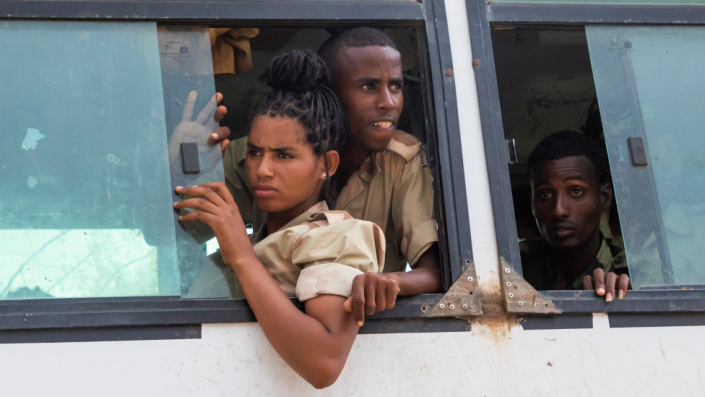
Eritrean authorities have intensified military mobilisation and are hunting down draft dodgers across the country, as the war in neighbouring Ethiopia escalates, multiple Eritrean sources have told the BBC.
The latest round-ups are the worst so far as women have not been spared, with many elderly mothers and fathers detained in a bid to force their children, who have gone into hiding, to surrender, they say.
They spoke on condition of anonymity as Eritrea is a highly restrictive state that controls almost all aspects of people’s lives.
Eritrea has sent troops to help the Ethiopian government against forces from its northern Tigray region, which borders Eritrea.
“As many ignored the call-up, the round-up has been intensified,” a source said, adding that wives have also been detained after their husbands tried to avoid conscription.
Checkpoints have been set up along major roads, and widespread searches are taking pace in cities and villages.
In the capital, Asmara, round-ups are being carried out on the streets while in many rural areas, the authorities have sealed homes, confiscated cattle and harassed relatives if a wanted person is not found, the BBC has been told.
The BBC has contacted the Eritrean government for comment.
Last month, Information Minister Yemane Gebremeskel said that a “tiny number” of reservists had been called up, denying that the entire population had been mobilised.
The almost two-year-long war in Tigray and neighbouring regions has been described by some analysts as bloodier than the conflict in Ukraine. But there has been less media coverage of it as the Ethiopian and Eritrean governments have heavily restricted travel, and communication lines to Tigray have mostly been down.
The Tigrayan People’s Liberation Front (TPLF), which controls the region and is leading the fight against Ethiopia’s government, has also embarked on a mass mobilisation campaign to bolster its forces. This follows the collapse of a five-month-long truce in August and the failure of the African Union to get peace talks off the ground.
A source in Eritrea said the authorities were trying to “stir emotions” at public meetings, linking their military intervention to “the existence and sovereignty of the nation”, and saying that the TPLF “must be buried”.


Last month, Eritrea recalled reservists under the age of 55 and some were sent to the frontlines.
In the last few days, fighting has been reported in many border areas, including Adigrat, Rama, Shiraro and Zalambesa.
But many Eritreans have resisted the latest call-up, saying they do not want to die in what they see as a needless war.
Elderly men have also “been forced to be on a war footing in many areas and in most cases, the operation of the conscription is being carried out arbitrarily”, one source said.
An Eritrean in the diaspora expressed concern about his brother and sister-in-law in Asmara.
He said his sister-in-law had fled with the couple’s children to her parent’s village, and he feared that his brother had been detained.
Authorities are also refusing to issue shopping coupons – used to buy basic commodities like sugar and oil at discounted prices – until families heed the call-up, sources added.
‘Hiding someone is treason’
“What they had been doing in the countryside, they have started in the capital, abusing families with the local administration coupons, licences and so on,” a source told the BBC.
Residents have been brought to the offices of local administrations, and warned that “hiding one’s children or husband, or cooperating in desertion is considered as treason”.
“They are putting a lot of stress on the people,” the source added.
One woman in Eritrea said that many people were frustrated and bitter as war has consumed the lives of generation after generation.
“People are expressing their opposition in various ways, but the security system is so merciless that it can commit any kind of atrocity against its people,” the woman added.


An Eritrean living in Europe said he feared for the safety of his family back home.
His 67-year-old father was a reservist who had been deployed in his area, though he has not yet been ordered to fight on the frontlines.
He was more worried about his 23-year-old sister, who, he said, had been detained at a military camp near the western city of Akurdet after being caught attempting to cross the border.
“It has been a while since the family heard from her. She is now missing,” the man said.
Sources said the authorities have been threatening to take detainees far away to areas with harsh conditions. The regime runs a network of secret detentions centres where people are held for many years without due process of law, human rights groups say.
The war in Tigray broke out in November 2020 following a massive fall-out between Ethiopia’s Prime Minister and Nobel Peace laureate Abiy Ahmed and the TPLF over a wide range of issues, including whether Ethiopia should retain an ethnically based federal system.
The conflict comes against the backdrop of long-standing hostility between the Eritrean regime and the TPLF, which dominated a coalition government in Ethiopia until Mr Abiy’s rise to power in 2018.
Under the TPLF, Ethiopia and Eritrea fought a border war which claimed the lives of about 80,000 people. An international tribunal later ruled that Ethiopia should hand over territory to Eritrea, but the TPLF-controlled government failed to do so.
Eritrea regained the territory soon after the current war started in November 2020.
In the 28 years since it gained independence from Ethiopia, Eritrea has fought wars with all of its neighbours – Yemen in 1995, Sudan in 1996, Ethiopia from 1998 to 2000 and Djibouti in 2008.
Mandatory military service was supposed to last for 18 months, but has become indefinite.
In the last two decades, tens of thousands of young Eritreans have left the country to escape the conscription, which includes forced labour.
“This situation has affected the children of my martyred brother whom I considered as my hope. They have joined the army. What can I say except to beg for God to protect all the young,” said an Eritrean woman exiled in Italy.






